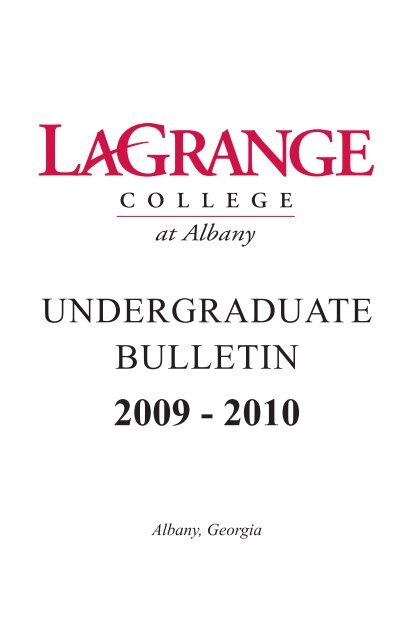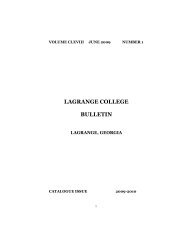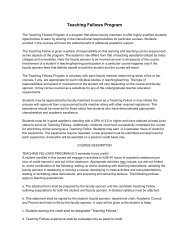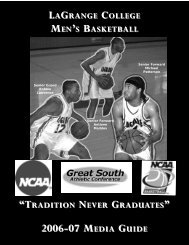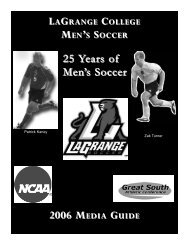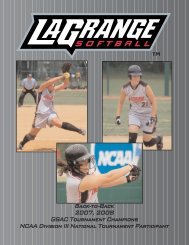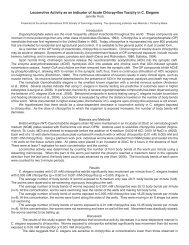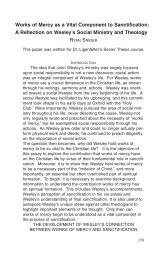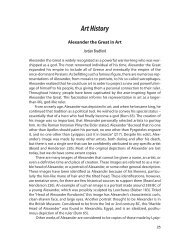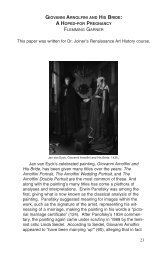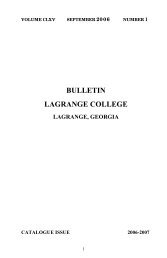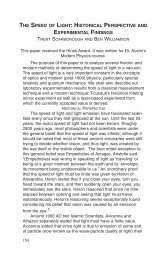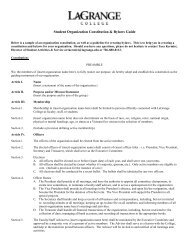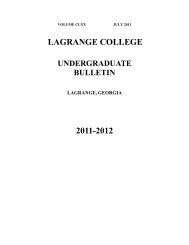2009-2010 Albany Undergraduate Bulletin (pdf) - LaGrange College
2009-2010 Albany Undergraduate Bulletin (pdf) - LaGrange College
2009-2010 Albany Undergraduate Bulletin (pdf) - LaGrange College
You also want an ePaper? Increase the reach of your titles
YUMPU automatically turns print PDFs into web optimized ePapers that Google loves.
at <strong>Albany</strong><br />
UNDERGRADUATE<br />
BULLETIN<br />
<strong>2009</strong> - <strong>2010</strong><br />
<strong>Albany</strong>, Georgia
at <strong>Albany</strong><br />
<strong>Bulletin</strong> <strong>2009</strong> - <strong>2010</strong><br />
<strong>Albany</strong>, Georgia<br />
Office Hours<br />
M, T, W, TH – 10AM TO 6PM<br />
Friday – 9AM TO 12 NOON<br />
229.420.8000<br />
www.lagrange.edu/albany<br />
i
Sc o p e o f Th i s Pu b l i c a t i o n<br />
This publication has been prepared for <strong>LaGrange</strong> <strong>College</strong> at <strong>Albany</strong>,<br />
a division of <strong>LaGrange</strong> <strong>College</strong>, <strong>LaGrange</strong>, Georgia. This publication<br />
includes admission-related material as well as policies and procedures<br />
through the year <strong>2009</strong>-<strong>2010</strong>. This publication supplements the current<br />
<strong>Bulletin</strong> of <strong>LaGrange</strong> <strong>College</strong>. The program offered by <strong>LaGrange</strong><br />
<strong>College</strong> at <strong>Albany</strong> is a well-defined and discrete program. It is a degreecompletion<br />
program (no courses in general education are offered). The<br />
<strong>Albany</strong> program is designed for more mature students who have been in<br />
the workplace for several years. The major, Organizational Leadership,<br />
is interdisciplinary. It emphasizes liberal arts. Students matriculate as<br />
a cohort group and remain together for the duration of the program.<br />
Teamwork and collaborative learning are emphasized. Because of these<br />
important distinctions, there are policies and procedures for <strong>Albany</strong><br />
that differ from those at <strong>LaGrange</strong> <strong>College</strong> in <strong>LaGrange</strong>. Where this<br />
document is silent, the policies are the same on both campuses. Where<br />
this document addresses a policy or procedure, that statement takes<br />
precedence over the <strong>LaGrange</strong> <strong>College</strong> (<strong>LaGrange</strong>) <strong>Bulletin</strong> for students<br />
enrolled in <strong>Albany</strong>.<br />
This publication is accurate at the time it is prepared. It is certain that a<br />
few policies and procedures will need to be modified. Enrolled students<br />
and students applying for admission will be informed of changes that<br />
will affect them. Changes will be made in the context of serving students<br />
better.<br />
This publication will be updated for the year <strong>2010</strong>-2011.<br />
ii
Mission St a t e m e n t<br />
f o r LaGr a n g e Co l l e g e a t Al b a n y<br />
Th e Mi s s i o n o f LaGr a n g e Col l e ge a t Al b a n y is t o Pr o v i d e<br />
Pr i vat e Ch r i s t i a n Ed u c a t i o n a t t h e Se n i o r Col l e ge Le v e l<br />
t o t h e So u t h w e s t Ge o r g i a Ar e a, Ce n t e r e d in Al b a n y;<br />
t o Ch a l l e nge t h e Mi n d s a n d In s p i r e t h e So u l s o f t h e<br />
St u d e n t s En rol l e d; t o Em p l o y Le a d i n g Pe d a g o g ic a l<br />
St r at egi es in Ac h i e v i n g Th e s e Go a l s; a n d t o Pr o d u c e<br />
t h e Ec o n o m ic Re s ou rc e s Ne c e s s a ry t o Pe r pet uat e a n d<br />
Ex pa n d t h e Pr o g r a m.<br />
<strong>LaGrange</strong> <strong>College</strong> reserves the right to make modifications in the<br />
degree requirements, courses, schedules, calendar, regulations, fees<br />
and other changes deemed necessary or conducive to the efficient<br />
operation of the college. Such changes become effective as announced<br />
by the proper college authorities.<br />
For <strong>LaGrange</strong> <strong>College</strong> at <strong>Albany</strong> these changes may include, but<br />
not be limited to the following: combining cohort groups, deferring<br />
starting a course, changing the order of the courses, and changing<br />
the curriculum. Should changes be necessary, the student will not<br />
have more requirements than are detailed in this publication.<br />
iii
<strong>LaGrange</strong> <strong>College</strong>, established in 1831, is owned by the North Georgia<br />
Conference of The United Methodist Church. <strong>LaGrange</strong> <strong>College</strong> is<br />
proud of this relationship and believes that its mission is an extension<br />
of the work of The United Methodist Church. <strong>LaGrange</strong> <strong>College</strong> is<br />
committed to the free, uninhibited pursuit of truth. Academic freedom<br />
and free expression of faculty and students are integral to the <strong>LaGrange</strong><br />
<strong>College</strong> ethos.<br />
<strong>LaGrange</strong> <strong>College</strong> is committed to challenging the minds and inspiring the<br />
souls of students by improving their creative, critical and communicative<br />
abilities. Faculty recognize the part they play in a student’s development<br />
by serving as mentors and role models. The total <strong>LaGrange</strong> <strong>College</strong><br />
program — curricular and cocurricular — is designed to challenge and<br />
support students as they deal with fundamental issues of self, world, and<br />
God.<br />
The principal curricular means by which the <strong>College</strong> assists students<br />
in the improving of their creative, critical and communicative abilities<br />
are an interdisciplinary, technologically sophisticated liberal arts<br />
program (A.A., B.A., B.S., B.M.), professional programs in business<br />
(B.B.A.), nursing (B.S.N.) and education (B.A., M.Ed., M.A.T), and<br />
Organizational Leadership (B.A., M.A.), and continuing education. The<br />
principal cocurricular means is through a comprehensive program of<br />
student life and athletics.<br />
<strong>LaGrange</strong> <strong>College</strong> strives to be a caring and ethical community. The<br />
hallmark of the <strong>LaGrange</strong> <strong>College</strong> community is the quest for civility,<br />
diversity, service, and excellence.<br />
<strong>LaGrange</strong> <strong>College</strong> is an equal opportunity employer and does not<br />
discriminate on the basis of race, sex, color, age or disability.<br />
iv
Ta b l e o f Co n t e n t s<br />
Calendar.................................................................................................. 2<br />
Accreditation.......................................................................................... 3<br />
Access..................................................................................................... 3<br />
Admission............................................................................................... 4<br />
Earning Credit Through the United States Armed Forces Institute<br />
and Service Schools................................................................................ 5<br />
Financial Information............................................................................. 6<br />
Refund Policies - Tuition and Fees......................................................... 7<br />
Federal Tax Credits................................................................................. 9<br />
Student Life.......................................................................................... 15<br />
Student Records.................................................................................... 19<br />
Student Grievance Procedure............................................................... 21<br />
Career Planning and Placement............................................................ 22<br />
Counseling and Testing........................................................................ 22<br />
Honor Code.......................................................................................... 23<br />
Information Technology and Academic Support Services................... 25<br />
Academic Program and Degree Requirements..................................... 25<br />
Class Attendance Regulations.............................................................. 27<br />
Course Descriptions.............................................................................. 28<br />
Glossary of Terms..................................................................................32<br />
Page 1
Calendar<br />
for Instruction and Holidays at<br />
LaGr a n g e Co l l e g e a t Al b a n y<br />
Ju l y <strong>2009</strong> - Au g u s t <strong>2010</strong><br />
Unless otherwise noted, classes meet on a<br />
Monday thru Thursday basis from 6:00 pm to 10:00 pm.<br />
<strong>2009</strong><br />
<strong>2010</strong><br />
Page 2<br />
July 1 – 7<br />
September 7<br />
November 25 – 26<br />
December 18 – 31<br />
January 1 – 3<br />
January 4<br />
January 18<br />
March 31 – April 6<br />
May 31<br />
July 1 – 7<br />
Summer Break<br />
(no classes, office closed)<br />
Labor Day<br />
(no classes, office closed)<br />
Thanksgiving<br />
(no classes, office closed)<br />
Christmas Break<br />
(no classes, office closed)<br />
New Years<br />
(no classes, office closed)<br />
<strong>College</strong> open, classes resume<br />
M. L. King Holiday<br />
(no classes, office closed)<br />
Easter Break<br />
(no classes, office closed)<br />
Memorial Day<br />
(no classes, office closed)<br />
Summer Break<br />
(no classes, office closed)
Ac c r e d i t a t i o n<br />
<strong>LaGrange</strong> <strong>College</strong> is accredited by the Commission on <strong>College</strong>s of the<br />
Southern Association of <strong>College</strong>s and Schools (1866 Southern Lane,<br />
Decatur, Georgia 30033-4097: Telephone number 404-679-4501) to<br />
award the degrees of Associate of Arts, Bachelor of Arts, Bachelor of<br />
Music, Bachelor of Science, Bachelor of Science in Nursing, Master<br />
of Education and Master of Arts in Teaching, and Master of Arts in<br />
Organizational Leadership.<br />
<strong>LaGrange</strong> <strong>College</strong> is also approved by the United Methodist University<br />
Senate. It has membership in the National Association of Independent<br />
<strong>College</strong>s and the Georgia Foundation for Independent <strong>College</strong>s. The<br />
Georgia Professional Standards Commission, which confers professional<br />
certificates upon college graduates meeting requirements in early<br />
childhood, middle grades, or secondary education, has awarded highest<br />
approval to <strong>LaGrange</strong> college’s program of teacher education.<br />
The <strong>Albany</strong> programs do not have specialized business program<br />
accreditation through the Association of Collegiate Business Schools<br />
and Programs (ACBSP).<br />
Ac c e s s<br />
<strong>LaGrange</strong> <strong>College</strong> at <strong>Albany</strong> admits qualified students of any race,<br />
color, religious tradition, national and ethnic origin to all the rights,<br />
privileges, programs and activities generally accorded or made available<br />
to students at <strong>LaGrange</strong> <strong>College</strong> at <strong>Albany</strong>. It does not discriminate on<br />
the basis of sex, race, color, religious tradition, national or ethnic origin<br />
in administration of its educational policies, admissions policies, loan<br />
programs and other school-administered programs.<br />
Page 3
Admission<br />
Clear Accept<br />
Applicants must present the following indication of their readiness to<br />
undertake senior-level study.<br />
• At least sixty (60) semester hours or ninety (90) quarter hours of<br />
acceptable transfer credits from a regionally accredited institution.<br />
(Many successful applicants may already have a four-year degree in<br />
another area.)<br />
• A 2.0 GPA on all college work, which must include at least 30 semester<br />
hours of general education courses drawn from and including at least<br />
one course from each of the following areas: English Composition,<br />
Humanities, Lab Science, Mathematics, History/Social Science.<br />
• Students under the age of twenty-five are not normally admitted<br />
to <strong>LaGrange</strong> <strong>College</strong> at <strong>Albany</strong>. Exceptionally strong and mature<br />
students under the age of twenty-five who are employed full-time<br />
or who are married or have dependents may petition to be admitted.<br />
Their petition should consist of a personal statement, two letters of<br />
recommendation one of which should be from a previous college<br />
instructor or adviser and the other should be from the current employer.<br />
The petition and supporting letters should emphasize the maturity of<br />
the student and the level of experience that the student will bring to<br />
the cohort group. The ability of the applicant to contribute to the<br />
growth of the group through examples and background is the basis<br />
for the over-25 expectation. The petition is delivered to the Director<br />
of <strong>LaGrange</strong> <strong>College</strong> at <strong>Albany</strong> who will review the applicant’s<br />
petition and other application materials. The Director will interview<br />
the candidate by telephone or in person. The Director will prepare<br />
a written recommendation and forward the recommendation to the<br />
Vice President for Academic Affairs who will forward the petition<br />
to the Director of Admission with a recommendation for action.<br />
• All transcripts of college-level work done.<br />
• Completed application that includes a personal statement, a resume,<br />
usual application information for non-traditional students, application<br />
fee, and a signed statement regarding full understanding of the nature<br />
and structure of the Organizational Leadership curriculum.<br />
Page 4
Deferred Accept<br />
The acceptance of some students may be deferred until they have met<br />
certain pre-entrance requirements:<br />
• Where the transferable credits are fewer than the requisite 60<br />
semester hours or 90 quarter hours, students may be accepted<br />
pending completion of the necessary course work at another<br />
institution. <strong>LaGrange</strong> <strong>College</strong> at <strong>Albany</strong> recommends coursework<br />
taken in this category.<br />
• Where the applicant’s college GPA is less than the required 2.0,<br />
the student may be asked to complete additional work at another<br />
institution prior to matriculating at <strong>LaGrange</strong> <strong>College</strong> at <strong>Albany</strong>.<br />
Their grades in those courses must demonstrate that they can be<br />
successful in a senior-level college program. Coursework taken in<br />
this category is to be specified by <strong>LaGrange</strong> <strong>College</strong> at <strong>Albany</strong>.<br />
• Where the applicant is lacking in one or more of the specific courses<br />
required for admission, such as English Composition, the student<br />
may be offered acceptance pending completion of the course(s).<br />
Ea r n i n g Cr e d i t t h r o u g h Un i t e d St a t e s Ar m e d<br />
Fo r c e s In s t i t u t e a n d Se r v i c e Sc h o o l s<br />
Courses taken through The United States Armed Forces Institute (USAFI)<br />
and other recognized military educational programs are accepted in<br />
accordance with the policy governing transfer work when presented on<br />
official transcripts from accredited institutions. Up to nine (9) semester<br />
hours of elective credit will be all for military service credit, including<br />
USAFI correspondence courses and military service school courses as<br />
recommended by the American Council on Education. Academic credit<br />
for one activity course in physical education, up to a maximum of four<br />
(4) semester hours, will be awarded for each two (2) months served in<br />
the Armed Forces. The maximum credit possible, then, is thirteen (13)<br />
semester hours. The Registrar at <strong>LaGrange</strong> <strong>College</strong> in <strong>LaGrange</strong> should<br />
be contacted in order to obtain appropriate credit. The telephone number<br />
for the Registrar is 706.880.8237.<br />
Page 5
Fi n a n c i a l In f o r m a t i o n<br />
Expenses<br />
1. Admission<br />
(Application for Admission, not refundable)................. $20.00<br />
2. Tuition, per semester hour, <strong>Albany</strong> only...................... $447.00<br />
3. General Fee ‡, per semester........................................... $60.00<br />
4. Testing Fee §, one time for all new students ...............$160.00<br />
5. Graduation (regardless of participation).........................$40.00<br />
Semester One Two Three Four<br />
Admission $20.00<br />
Tuition $6705.00 $5811.00 $5811.00 $5811.00<br />
General $60.00 $60.00 $60.00 $60.00<br />
Testing $160.00<br />
Graduation $40.00<br />
Total $6945.00 $5871.00 $5871.00 $5911.00<br />
‡ General Fee, half of the general fee is held in reserve for use<br />
by the group to help fund their service/leadership project. The<br />
remainder is used to reinforce strong group ties by helping to fund<br />
group activities. The students determine the expenditure of all of<br />
these monies.<br />
§ The Testing Fee is required for the necessary pre-and post-testing<br />
of students to measure outcomes and program effectiveness.<br />
Note: Students should expect to spend approximately $300 - $500 per<br />
semester on textbooks. Students are also expected to have a personal<br />
computer with Internet access. Depending on which Internet Service<br />
Provider is selected, the cost ranges from $20-50 per month.<br />
Page 6
Re f u n d Po l i c i e s -Tuition a n d Fe e s<br />
A student who plans to withdraw from the college must make an official<br />
notification of his/her plan. The Director of <strong>LaGrange</strong> <strong>College</strong> at <strong>Albany</strong><br />
has been identified as the official office of notification. The student<br />
should also consult the Financial Aid Office and the Business Office to<br />
determine the financial consequences of a complete withdrawal.<br />
Even though a student registers and pays for an entire semester, the<br />
courses are taught sequentially. Students who withdraw prior to the first<br />
class receive a 100% refund of tuition and fees. After the first class has<br />
met, and before the second class has met, a student will receive a 50%<br />
refund for that class and 100% refund for subsequent classes that have<br />
not started. An example: A student has registered for the first semester<br />
(five courses), and he/she completed the first course and the first class of<br />
the second course. The student then withdraws. The withdrawing student<br />
receives a 100% refund for the courses not started (the third, fourth and<br />
fifth) and a 50% refund for the course that he just started. There is no<br />
refund for the courses completed nor courses that have had their second<br />
class meeting.<br />
No refund of any nature will be made to any student who is suspended or<br />
dismissed for disciplinary reasons.<br />
The Department of Education requires all unearned Title IV aid to be<br />
returned to the program from which such aid was awarded. The <strong>College</strong><br />
will apply a credit to the student’s account for all unearned “institutional<br />
charges.” The Department of Education defines “institutional charges”<br />
as all charges for tuition, fees, and room and board, and expenses for<br />
required course materials, if the student does not have a “real and<br />
reasonable opportunity” to purchase the required course materials from<br />
any place but the school.<br />
Refund Policies for Students Receiving Financial Aid<br />
<strong>LaGrange</strong> <strong>College</strong> does not advance any funds to students prior to the<br />
date of enrolling.<br />
A separate refund policy exists for new, first semester students who<br />
receive Title IV federal financial assistance. Information is available in<br />
the Financial Planning Office.<br />
Page 7
Georgia residents receiving credit for the Tuition Equalization Grant and<br />
the HOPE Scholarship must be continuously enrolled for 14 days beyond<br />
drop add to be eligible for these funds. Course drops reducing the course<br />
load below 12 hours will result in the loss of these grants.<br />
Financial aid is considered to be used for direct educational costs —<br />
tuition, fees, books, room and board. Therefore, if a student withdraws<br />
and is scheduled to receive a refund, funds will be returned to the<br />
appropriate program(s) from which the student received funds. The<br />
balance will be refunded to the student.<br />
A student will not receive a refund until all financial aid programs have<br />
been reimbursed. Refunds will be returned in the order indicated in the<br />
“Allocation Policy” below:<br />
1st to Unsubsidized Federal Stafford Loan Program<br />
2nd to Subsidized Federal Stafford Loan Program<br />
3rd to Federal Perkins Loan Program<br />
4th to Federal PLUS Program<br />
5th to Federal Pell Grant Program<br />
6th to Federal SEOG Program<br />
7th to other Title IV Programs<br />
8th to other federal, state, or private programs<br />
9th to the student<br />
Official transcripts and diplomas are withheld from any student<br />
who has a financial obligation to <strong>LaGrange</strong> <strong>College</strong>.<br />
Student Repayment Policy<br />
Students who receive cash disbursements after registration for that<br />
enrollment period will be assessed liability for repayment of the<br />
appropriate percentage of the refund due the Title IV programs upon<br />
withdrawal, expulsion, or suspension.<br />
Students who receive cash disbursements that are attributable to Federal<br />
Pell, SEOG, Perkins Loan, or SSIG programs may owe a repayment<br />
of these funds to <strong>LaGrange</strong> <strong>College</strong> to prevent an overpayment. A<br />
student who owes a repayment will be deemed ineligible for any<br />
financial assistance from any source until the student has resolved the<br />
overpayment. Repayments will be allocated to the student aid programs<br />
in the following order: Federal Perkins Loan, Pell Grant, SEOG, other<br />
Title IV programs, and then to the institution.<br />
Page 8
Students have 45 days from the date of their notification to make<br />
arrangements for repayment of the aid received. If they fail to make<br />
satisfactory arrangements within the 45-day time period, the account<br />
will be submitted to the Department of Education and the student could<br />
lose future eligibility for financial aid programs.<br />
Fe d e r a l Ta x Cre d i t s<br />
The Tax Reform Act of 1997 provided two tax credits for higher education.<br />
The “Hope Credit” Provides a $1,500 tax credit for the first two years of<br />
post¬secondary education in a program that leads to a degree, certificate,<br />
or other recognized educational credential. The student must be enrolled<br />
at least halftime. Qualified expenses are for tuition and fees and do not<br />
include room, board, books, insurance, and other similar expenses.<br />
The second tax credit is the “Lifetime Learning Credit” which provides<br />
a $1,000 per year tax credit (per family). For additional information<br />
about these two credits, please consult the Business Office or your tax<br />
preparer.<br />
These tax credits are phased out as your modified adjusted gross income<br />
exceeds certain limits. Please check with your tax advisor regarding<br />
these limits.<br />
General Financial Aid Information<br />
You and your family are expected to contribute to the cost of college<br />
attendance to the extent of your ability. However, realizing that it is not<br />
always possible for a family to meet the expenses of college alone, federal<br />
and state financial aid programs were established to assist families in<br />
paying for college. To identify families in need of financial assistance,<br />
a general need analysis form was developed. The Free Application<br />
for Federal Student Aid (FAFSA) is the need analysis form used to<br />
determine your family’s Expected Family Contribution (EFC). The EFC<br />
is deducted from the Cost of Attendance at <strong>LaGrange</strong> <strong>College</strong>, which is<br />
composed of tuition, fees, books, supplies, room, board, transportation,<br />
and personal expenses, to determine a student’s financial need. Your<br />
financial need determines financial aid programs for which you qualify.<br />
Although financial need is a factor in most financial aid programs, there<br />
are programs where financial need is not a factor.<br />
Page 9
Applying for Financial Aid<br />
Applicants for financial assistance (including HOPE Scholarship) must<br />
complete the applicable financial aid application annually. Financial<br />
aid applications are available at the <strong>LaGrange</strong> at <strong>Albany</strong> office or at the<br />
main campus by contacting the Financial Aid Office at 1-888-253-9918.<br />
Students interested in financial assistance must:<br />
• Complete a Georgia Tuition Equalization Grant Application<br />
(applicable to Georgia residents only)<br />
• Complete the Free Application for Federal Student Aid (FAFSA)<br />
applicable to your academic calendar. Please include our Title<br />
IV School Code (001578) on your application to insure that<br />
we receive your processed application. You may complete the<br />
FAFSA electronically at www.fafsa.ed.gov.<br />
Financial Aid Deadlines<br />
You are encouraged to submit your financial aid application 6 weeks<br />
prior to the beginning of the term.<br />
General Financial Aid Eligibility Requirement<br />
To be eligible for financial assistance, you must:<br />
• Be a U.S. Citizen or permanent resident alien.<br />
• Have a high school diploma or a General Education Development<br />
(GED) Certification, or pass an approved Ability-to-Benefit<br />
test.<br />
• Be fully accepted for admission.<br />
• Be making Satisfactory Academic Progress towards the<br />
completion of your degree program.<br />
• Not be in default on any federal educational loan or have made<br />
satisfactory arrangements to repay the loan.<br />
• Not owe a refund on a federal or state grant.<br />
• Not have borrowed in excess of federal loan limits.<br />
• Be registered with Selective Service, if required.<br />
Completing the Financial Aid Process<br />
After your FAFSA is submitted to the Central Processor, you will receive<br />
a Student Aid Report (SAR). <strong>LaGrange</strong> <strong>College</strong> will receive an electronic<br />
copy of your SAR called an Institutional Student Information Report<br />
Page 10
(ISIR). The Financial Aid Office will review your ISIR to determine if<br />
additional information is needed to complete your financial aid file or<br />
to establish your eligibility to participate in financial aid programs. If<br />
you are selected for verification by the federal government or <strong>LaGrange</strong><br />
<strong>College</strong> or have eligibility issues, you will receive a “missing information<br />
letter” from the Financial Aid Office requesting additional information.<br />
If discrepancies are found as a result of verification, the Financial Aid<br />
Office will transmit the corrected information to the Central Processor.<br />
You will receive a revised Student Aid Report (SAR) reflecting the<br />
updated information.<br />
Financial Aid Awards<br />
Once all documents necessary to determine your financial aid eligibility<br />
are submitted and you are accepted for admission, you will receive a<br />
financial aid award letter disclosing the financial aid programs available<br />
to assist you with school. Your award letter will be mailed in duplicate to<br />
your permanent mailing address. You must submit a signed copy of the<br />
award letter indicating the financial aid programs you wish to accept or<br />
decline. You will also have an opportunity to reduce or increase the amount<br />
of loan included in your financial aid award. A copy of “Understanding<br />
Your Financial Aid Award Letter,” which explains information about<br />
the financial aid programs included in your award letter and eligibility<br />
requirements, will accompany your award letter and any supplemental<br />
forms necessary for the processing of individual awards.<br />
If you receive or expect to receive educational assistance from an<br />
outside source, i.e. employer tuition reimbursement plan, veteran<br />
benefits, vocational rehabilitation benefits, etc., you must report these<br />
resources to the Financial Aid Office and provide a copy of the benefit<br />
or reimbursement policy to the Business Office. If these funds result in<br />
financial assistance that exceeds your financial need, the Financial Aid<br />
Office must cancel, reduce, or modify your financial aid award.<br />
Page 11
Available Financial Aid Programs<br />
Federal Pell Grant is a federal grant awarded to undergraduate students<br />
pursuing their first bachelor’s degree with exceptional financial need.<br />
Your Expected Family Contribution determines eligibility for Federal<br />
Pell Grant.<br />
Federal Supplemental Educational Opportunity Grant is a federal<br />
grant awarded to undergraduate students with exceptional financial need.<br />
Priority is given to Pell eligible students with the lowest EFC.<br />
The HOPE Scholarship Program is a non-need based State of Georgia<br />
scholarship awarded to Georgia residents who graduated from high<br />
school on or after June 1996 with a “B” average. A student who did not<br />
graduate from high school as a HOPE Scholar may become eligible for<br />
the HOPE Scholarship after completing 30, 60, or 90 semester hours.<br />
HOPE Scholars attending a private college or university must be fulltime<br />
to qualify. The award is $1,500 per semester for students attending<br />
a Georgia private college or university. HOPE Scholarship recipients<br />
may receive funding (provided all eligibility requirements are met) for<br />
a maximum of 127 attempted semester hours of college credit. The 127<br />
maximum semester hours includes all college courses taken since your<br />
high school graduation regardless of whether or not you received HOPE<br />
funds.<br />
Georgia Tuition Equalization Grant is a State of Georgia non-needbased<br />
grant awarded to Georgia residents attending a private college or<br />
university as a full-time student. The annual amount is contingent upon<br />
funding by the Georgia Legislature. The current amount of the grant is<br />
$500 per semester.<br />
Federal Subsidized Stafford Loan is a repayable loan awarded based<br />
on demonstrated financial need. The Federal government pays any<br />
accrued interest on the loan while the student is enrolled in school,<br />
during the grace period or during authorized periods of deferment. The<br />
annual loan limit is discussed in “Federal Stafford Loan Annual Loan<br />
Limits” below.<br />
Federal Unsubsidized Stafford Loan is not awarded based on financial<br />
need. Any student regardless of income may participate in this loan<br />
program. However, interest does accrue from the date of disbursement<br />
Page 12
until the loan is paid in full. The borrower has the option of paying the<br />
accrued interest or having the interest capitalized. The annual loan limit<br />
is discussed in “Federal Stafford Loan Annual Loan Limits” below.<br />
Federal Stafford Loan Annual Loan Limits<br />
The amount of Federal Stafford Loan funds a student may receive each<br />
academic year is based on the student’s classification and financial need.<br />
Dependent undergraduate students may borrow a maximum of $3,500<br />
as a freshmen; $4,500 as a sophomore; $5,500 as a junior or senior<br />
combined from the Federal Subsidized and Unsubsidized Stafford Loan<br />
Program. Independent students may borrow at the same annual amounts<br />
as a dependent student; however, an independent student is eligible<br />
for additional funds from the Unsubsidized Stafford Loan Program.<br />
Independent students classified as freshmen or sophomores may borrow<br />
an additional $4,000 and students classified as juniors or seniors may<br />
borrow an additional $5,000.<br />
Aggregate Loan Limits<br />
Federal regulations set a maximum aggregate (lifetime) loan limit on the<br />
amount of Federal Stafford Loan (combined Subsidized and Unsubsidized<br />
Stafford Loans) funds a student may borrow for an undergraduate degree<br />
program. The aggregate loan limit for a dependent undergraduate student<br />
is $23,000 and $46,000 for an independent undergraduate student.<br />
Federal Stafford Loan Entrance/Exit Counseling<br />
Federal regulations require all first-time Federal Stafford borrowers to<br />
complete Stafford Loan Entrance Counseling before receiving the first<br />
disbursement of their loan proceeds. If you have previous loans and are<br />
transferring to <strong>LaGrange</strong> <strong>College</strong> from another institution, you must also<br />
complete entrance counseling.<br />
Students who are graduating or transferring to another institution must<br />
complete Federal Stafford Loan Exit counseling. Students at the <strong>Albany</strong><br />
Campus should fulfill this requirement on-line at www.mapping-yourfuture.org.<br />
Veterans Benefits<br />
Students who are eligible for various veterans’ benefits should coordinate<br />
their application for any benefits through the Registrar at <strong>LaGrange</strong><br />
<strong>College</strong> in <strong>LaGrange</strong>. That office telephone number is 706.880.8024.<br />
Page 13
Disbursement of Financial Aid<br />
Although students in the Organizational Leadership Program register for a<br />
full load at the beginning of each semester, the courses are taught sequentially,<br />
which means you complete the first course before beginning the next course.<br />
Because of the nature in which the courses are taught, the disbursement of<br />
financial aid occurs throughout the term as individual courses are completed.<br />
Students receiving Federal Stafford Loans are eligible for disbursement<br />
after completing 6 credit hours. Generally Pell and Federal SEOG Grant<br />
recipients are eligible for half of their funds after completing 6 credit hours<br />
with the remaining half disbursed when they become full-time. The HOPE<br />
Scholarship and Georgia Tuition Equalization Grant are the last funds to be<br />
disbursed because you must reach full-time status and maintain it for 14 days<br />
beyond the beginning of the fourth course or 12th credit hour. A schedule of<br />
disbursement dates will be provided with the financial aid award letter.<br />
Prior to the disbursement of your financial aid, a final eligibility review will<br />
occur to determine if you meet the eligibility requirements for financial aid.<br />
In order for your financial aid to be disbursed, you must have submitted all<br />
required documents for disbursement; must be registered for classes; must<br />
be meeting Satisfactory Academic Progress standards; and must be enrolled<br />
for the appropriate number of credit hours necessary to establish eligibility<br />
for individual financial aid programs.<br />
All financial aid funds are disbursed directly to your student account in the<br />
Business Office. The funds are applied towards current tuition and fees,<br />
and other applicable charges such as room, board, testing fees, books, and<br />
other charges as authorized by you. Financial aid funds are for educational<br />
purposes only. Students who fail to enroll or attend classes are not eligible for<br />
financial aid. Awards that require additional documents will not be disbursed<br />
until such time as all requirements for disbursement are met. For example,<br />
students who have Stafford Loans must submit a completed Federal Stafford<br />
Loan Master Promissory Note to their lender and complete Stafford Loan<br />
Entrance counseling before their loan funds can be disbursed.<br />
Refund of Excess Financial Aid<br />
If your financial aid funding exceeds your current tuition and fee charges (a<br />
credit balance), you will receive a refund of the residual funds 14 days from<br />
the date the credit occurred. All refund checks are issued and mailed by the<br />
Business Office. If you wish to leave the remaining funds on your account<br />
for subsequent terms, you must sign a Student Authorization Form with the<br />
Business Office.<br />
Page 14
St u d e n t Li f e<br />
Student Development Goals<br />
The Student Development Goals of the <strong>LaGrange</strong> <strong>College</strong> at <strong>Albany</strong><br />
program are as follows:<br />
• To facilitate the transition of non-traditional students (25 years<br />
of age and older) back into a college learning environment in<br />
pursuit of a college degree.<br />
• To enhance cooperation and teamwork through a cohort model<br />
where students begin, continue and complete the program<br />
together as a cohort unit.<br />
• To provide a learning environment in which the “Student Code<br />
of Conduct” is affirmed, respected and enforced.<br />
• To assist students who are already employed and on a career<br />
track to discern further life goals and career planning, including<br />
advancement through promotions or career changes.<br />
• To enhance personal integrity through commitment to the<br />
<strong>LaGrange</strong> <strong>College</strong> Honor Code.<br />
• To provide a comfortable, clean and safe environment where<br />
learning and academic study can be pursued.<br />
• To provide an ongoing evaluation of student support services<br />
through the regular use of the “<strong>LaGrange</strong> <strong>College</strong> at <strong>Albany</strong><br />
Student Survey.”<br />
It shall be the responsibility of the Associate Dean and Director of the<br />
<strong>Albany</strong> program, in consultation with the appropriate administrative<br />
personnel at <strong>LaGrange</strong> <strong>College</strong>, to see that these goals are disseminated,<br />
supported, evaluated and enforced.<br />
Student Code of Conduct<br />
The student Code of Conduct is a set of rules that regulate student<br />
behavior. The Director of <strong>LaGrange</strong> <strong>College</strong> at <strong>Albany</strong> adjudicates<br />
violations of the Student Code of conduct.<br />
Introduction<br />
The responsibility to secure and to respect general conditions conducive<br />
to the freedom to learn is shared by all members of the academic<br />
community. This <strong>College</strong> has a duty to develop policies and procedures<br />
that provide a safeguard to this freedom.<br />
By registering at <strong>LaGrange</strong> <strong>College</strong>, the student neither loses the rights<br />
nor escapes the duties of a citizen. Each student should conduct his/her<br />
Page 15
personal life in the context of mutual regard for the rights and privileges<br />
of others.<br />
Therefore, it is expected that students will demonstrate respect for the<br />
law and for the necessity of orderly conduct as a member of the campus<br />
community.<br />
Students are responsible for being fully acquainted with the college<br />
catalog, handbook, and other regulations relating to students and<br />
for complying with them in the interest of an orderly and productive<br />
community. Failure or refusal to comply with the rules and policies<br />
established by the <strong>College</strong> may subject the offender to disciplinary<br />
actions up to and including permanent dismissal from the <strong>College</strong>.<br />
Violations of any of the following by a student constitute an offense,<br />
which may result in disciplinary action.<br />
A. The use of threatening or obscene calls, and obscene graffiti is<br />
considered unwarranted and below the dignity of members of<br />
the <strong>College</strong> community and will not be tolerated.<br />
B. Conduct endangering safety and welfare. Any conduct which<br />
endangers the safety and welfare of other individuals such<br />
as hazing, assault, battery, abuse or threat of abuse, on or off<br />
campus is prohibited.<br />
C. Use of firearms, weapons. No student may possess, use or sell on<br />
campus any weapons or firearms, or any incendiary, explosive,<br />
or destructive device, including fireworks.<br />
D. Criminal arrest. If a student is arrested and charged with a<br />
serious or violent crime off campus, a hearing may be held<br />
as soon as possible to determine if his continued presence on<br />
campus presents a possible threat of danger to members of<br />
the <strong>College</strong> community. The infraction of a city ordinance, a<br />
state or federal law by a student constitutes a breach of college<br />
discipline. The college will act in the best interest of the campus<br />
community and suspend a student who has been arrested, even<br />
if not yet convicted by the legal system.<br />
E. Use of illegal drugs. The use, possession, sale, or distribution<br />
of narcotics and drugs, except as expressly permitted by law, is<br />
strictly prohibited.<br />
Page 16
F. Possession of alcoholic beverages. The consumption or possession<br />
of alcoholic beverages on campus is strictly prohibited.<br />
G. Disorderly conduct, abusive, drunk and disorderly, violent or<br />
excessively noisy conduct on or in the vicinity of the <strong>College</strong><br />
campus is prohibited.<br />
H. Giving false information. Anyone knowingly making a false<br />
oral or written statement to any member of administration,<br />
faculty, staff, or student body with the intent to deceive may be<br />
disciplined accordingly.<br />
I. Misuse of property. Anyone who misuses, defaces, or damages<br />
<strong>College</strong> buildings, property or library holdings, or private<br />
property located on campus shall be subject to disciplinary<br />
action.<br />
J. Theft and illegal possession. The unauthorized taking,<br />
misappropriation, or possession of any property or library<br />
holdings owned or maintained by the <strong>College</strong> or by any person<br />
on campus is prohibited.<br />
K. Unauthorized entry. A student may not enter, or attempt to enter<br />
any <strong>College</strong> building room without proper authorization and<br />
legitimate purpose.<br />
L. Academic dishonesty. Cheating, plagiarism, submitting another<br />
person’s material as one’s own, or doing work for another<br />
person who will receive academic credit are all impermissible.<br />
This includes the use of unauthorized books, notebooks, or other<br />
sources in order to secure or to give help during an examination;<br />
the unauthorized copying of examinations, assignments,<br />
reports, or term papers; or the presentation of unacknowledged<br />
materials as if it were the student’s own work. Violations of this<br />
kind are under the purview of the Honor Council.<br />
Non-Discrimination<br />
<strong>LaGrange</strong> <strong>College</strong> does not discriminate on the basis of age, color,<br />
race, national or ethnic origin, handicap, or sex in the administration of<br />
educational policies, admissions policies, financial aid, employment or<br />
any other program or activity.<br />
Page 17
Racial Harassment<br />
<strong>LaGrange</strong> <strong>College</strong> expects its students to treat other persons with respect<br />
and human dignity in all interpersonal relationships. Any behavior that<br />
results in racial abuse, harassment, or intimidation of another person,<br />
or any unwanted objectionable racial attention towards another person,<br />
will not be tolerated and is a violation of the <strong>College</strong>’s Code of Student<br />
Conduct.<br />
Sexual Harassment<br />
Sexual harassment may take two forms:<br />
(1) creating a hostile environment, and<br />
(2) quid pro quo.<br />
1. A hostile, demeaning, or intimidating environment created by<br />
sexual harassment interferes with an individual’s full and free<br />
participation in the life of the <strong>College</strong>.<br />
2. Sexual harassment quid pro quo occurs when a position of<br />
authority is used to threaten to impose a penalty or to withhold<br />
a benefit in return for sexual favors, whether or not the attempt<br />
is successful. Sexual harassment may involve behavior by<br />
a person of either gender against a person of the same or<br />
opposite gender. It should be noted that the potential of sexual<br />
harassment exists in any of the following relationships: student/<br />
student, faculty/student, student/faculty, and faculty/faculty.<br />
Here and subsequently “faculty” refers to faculty, staff, and<br />
administration. Because of the inherent differential in power<br />
between faculty and students, sexual relationships between<br />
faculty and students are prohibited.<br />
Sexual harassment may result from many kinds of behavior. These<br />
behaviors may range from the most egregious forms, such as sexual<br />
assault, to more subtle forms. Explicit behaviors include but are not<br />
limited to requests for sexual favors, physical assaults of a sexual<br />
nature, sexually offensive remarks, and rubbing, touching or brushing<br />
against another’s body. More subtle behaviors may be experienced as<br />
intimidating or offensive, particularly when they recur or one person has<br />
authority over another. Such behaviors may include but are not limited to<br />
unwelcome hugs or touching, inappropriate staring, veiled suggestions<br />
of sexual activity, requests for meetings in non-academic settings, and<br />
risqué jokes, stories, or images.<br />
Page 18
Solicitation<br />
Individuals or student organizations may not engage in commercial<br />
sales and fund-raising projects unless the proceeds from such sales and<br />
projects are used for charitable or philanthropic purpose. Clearance<br />
for such activities must be obtained in advance from the Director of<br />
<strong>LaGrange</strong> <strong>College</strong> at <strong>Albany</strong>.<br />
Grades and Certification of Enrollment<br />
The Registrar’s Office will provide a copy of student’s grades and will<br />
certify the enrollment of students for insurance or scholarship purposes.<br />
St u d e n t Re c o r d s<br />
In general, all present and past students have the right to personally<br />
review their own educational records for information and to determine the<br />
accuracy of these records. A photo ID or other equivalent documentation,<br />
or personal recognition by the custodian of record will be required before<br />
access is gained.<br />
<strong>LaGrange</strong> <strong>College</strong> assures the confidentiality of student educational<br />
records in accordance with the Family Educational Rights and Privacy<br />
Act of 1974.<br />
Exception to Access Rights<br />
Students do not have access to:<br />
1. personal notes of administrative, faculty, or supervisory<br />
personnel which are not accessible to or revealed to other<br />
parties;<br />
2. confidential letter of recommendation placed in files before<br />
January 1, 1975, or those where student has waived right to<br />
access; or<br />
3. medical, psychiatric or psychological data recorded by<br />
professionals or paraprofessionals solely for their own use<br />
in treatment of the student; however, a physician or other<br />
appropriate professional of the student’s choice can review<br />
such records.<br />
Page 19
Student consent prior to records release<br />
Student educational record information will not be transmitted to third<br />
parties outside the <strong>College</strong> without the student’s written consent, with<br />
the following exceptions:<br />
1. Public information: student’s name, address, telephone<br />
listing, academic major, dates of attendance, awards received,<br />
participation in officially recognized activities and sports,<br />
weight and heights of athletic team members. This information<br />
will be released to anyone requesting it. Information which can<br />
be released to the public on any student is name, class, major,<br />
date of attendance, degree earned, awards received, local<br />
and permanent address, and telephone number. The abovecited<br />
information will not be released if a student notifies the<br />
Registrar’s Office not to release information.<br />
2. Information concerning application for or receipt of financial<br />
aid, which may be released to official agencies, involved in<br />
decisions and aid allocations.<br />
3. Information released by <strong>College</strong> officials with a legitimate<br />
educational interest.<br />
4. Information required by federal or state agencies as specifically<br />
provided by law.<br />
5. Information needed in connection with an emergency to<br />
protect the health or safety of the students or other persons, as<br />
authorized by Department of Education regulations.<br />
Types of records maintained<br />
Examples of “educational records” maintained on a student may include<br />
but are not necessarily limited to, the following:<br />
Academic: admission data, courses attempted, grades, dates<br />
of enrollment, degrees awarded, academic hours<br />
and awards received - Registrar’s Office<br />
Alumni: personal, educational, and professional data,<br />
contributions and gifts -Alumni Office and<br />
Advancement Office<br />
Conduct: disciplinary records, law violation - Student<br />
Development Office<br />
Financial: student’s confidential statements, Financial Aid<br />
data –Student Financial Planning Office; charges,<br />
payments, delinquent accounts -Business Office<br />
General: directory information, correspondence, biographical<br />
data – office of record to which information was<br />
provided or correspondence addressed<br />
Page 20
St u d e n t Gr i e v a n c e Pr o c e d u r e<br />
Purpose<br />
<strong>LaGrange</strong> <strong>College</strong> is committed to a policy of treating all members of the<br />
<strong>College</strong> Community fairly in regard to their personal and professional<br />
concerns.<br />
The primary objective of a student grievance procedure is to insure that<br />
concerns are promptly dealt with and resolution reached in a fair and just<br />
manner. It is essential that each student be given adequate opportunity to<br />
bring complaints and problems to the attention of <strong>College</strong> administration<br />
with the assurance that each will be given fair treatment.<br />
Definition<br />
A grievance is defined as dissatisfaction occurring when a student feels<br />
or thinks that any condition affecting him/her is unjust, inequitable,<br />
or creates unnecessary hardship. Such grievances include, but are not<br />
limited to, the following: academic problems (excluding grades, see<br />
the current <strong>LaGrange</strong> <strong>College</strong> <strong>Bulletin</strong> for the grade appeal procedure),<br />
mistreatment by any college employee, incorrect assessment of fees,<br />
records and registration errors, student employment and discrimination<br />
because of race, national origin, sex, marital status, religion, age or<br />
handicap.<br />
Grievance Procedure<br />
The initial phase of the student grievance procedure normally requires<br />
an oral discussion between the student and the person(s) alleged to have<br />
caused the grievance in order to discuss and resolve the grievance. The<br />
meeting should be held as soon as the student first becomes aware of the<br />
act or condition that is the basis for the grievance. If the student decides<br />
not to meet with the person(s) alleged to have caused the grievance, or<br />
consider the response to this discussion to be unsatisfactory and feels<br />
that the grievance still exists, the grievance should be put in writing and<br />
filed with the Director of <strong>LaGrange</strong> <strong>College</strong> at <strong>Albany</strong>.<br />
Grievance Appeal Procedure<br />
Any student who is not satisfied with the response after utilizing the<br />
administrative channels outlined above should present the grievance in<br />
written form to the Vice President for Academic Affairs and Dean or the<br />
President with a copy to the individual(s) complained about.<br />
Page 21
Ca re e r Pl a n n i n g a n d Pl a c e m e n t<br />
Career planning and advancement are part and parcel of the general<br />
curriculum in Organizational Leadership. Throughout the curriculum<br />
each student is challenged to assume control over her/his destiny. No<br />
formal office of career planning or placement exists—but the under<br />
girding thesis of the program is that significant career planning occurs.<br />
As <strong>LaGrange</strong> <strong>College</strong> at <strong>Albany</strong> students are employed, placement is not<br />
a significant need. In those rare instances where employment changes<br />
occur, students should consult the Director of <strong>LaGrange</strong> <strong>College</strong> at<br />
<strong>Albany</strong> for possible assistance.<br />
Co u n s e l i n g a n d Te s t i n g<br />
Informal counseling in academic areas is available on site. Students who<br />
need academic counseling should talk with the Director. If the academic<br />
counseling needs exceed the expertise of the staff of <strong>LaGrange</strong> <strong>College</strong><br />
at <strong>Albany</strong>, the academic resources of <strong>LaGrange</strong> <strong>College</strong>’s home campus<br />
are available through e-mail and telephone.<br />
<strong>LaGrange</strong> <strong>College</strong> at <strong>Albany</strong> offers no formal process for personal<br />
counseling. The cohort group has often been effective in assisting<br />
students make adjustments to the changes in routine brought about by<br />
the demands of returning to school. Students should seek referrals for<br />
more difficult problems.<br />
Students at <strong>LaGrange</strong> <strong>College</strong> at <strong>Albany</strong> are continually assessed in<br />
order to determine the effectiveness of the program in meeting their<br />
needs. There is an initial pre-test of leadership knowledge and skills.<br />
At the conclusion of the program, there is a post-test. The Director of<br />
<strong>LaGrange</strong> <strong>College</strong> at <strong>Albany</strong> is responsible for administering these<br />
achievement tests. There are many other situations where students may<br />
seek additional testing. These tests might include CLEP, GRE, GMAT<br />
and others. The Director of <strong>LaGrange</strong> <strong>College</strong> at <strong>Albany</strong> will assist the<br />
students in addressing these needs.<br />
Page 22
Ho n o r Co d e<br />
Students at <strong>LaGrange</strong> <strong>College</strong> sign the Honor Code, which states,<br />
As a member of the student body of <strong>LaGrange</strong> <strong>College</strong>, I<br />
confirm my commitment to the ideals of civility, diversity,<br />
service, and excellence. Recognizing the significance of<br />
personal integrity in establishing these ideals within our<br />
community, I pledge that I will not lie, cheat, steal, nor<br />
tolerate these unethical behaviors in others.<br />
The Honor Council deals with students accused of violating the Honor<br />
Code. The Honor Council is selected each spring by the outgoing Chair<br />
of the Honor Council, The Dean of Students, and the Vice President for<br />
Academic Affairs and Dean. A member of the faculty serves as advisor.<br />
Members of the faculty are strongly urged to support the efforts of the<br />
Honor Council by reporting all suspected violations of the Honor Code.<br />
The Honor Code assumes that any student witnessing or otherwise<br />
having knowledge of an Honor Code violation will report the violation<br />
to the course instructor, the Chair of the Honor Council, or the Vice<br />
President for Academic Affairs and Dean. (For a complete description of<br />
the Honor Code, please see the Student Handbook.)<br />
The following are violations of the Honor Code:<br />
1. Lying.<br />
2. Cheating by either giving aid to or receiving aid from a student<br />
or other source without the consent of the faculty member or<br />
plagiarizing (using another person’s words or ideas without<br />
documenting them properly).<br />
3. Stealing (intentionally taking or appropriating without the right<br />
or permission any individual, organizational, or institutional<br />
property. This includes, but is not limited to, stealing off<br />
campus, stealing from any person or business representatives<br />
on this campus, stealing from a computer company or any other<br />
computer-related theft, from the telephone system, vending<br />
machines, a residence hall visitor, or any other business while<br />
it is on this campus, and removal of any material or equipment<br />
from the Library or other facilities without permission.)<br />
4. Failure to report a violation of the Honor Code.<br />
5. Failure to appear before the Honor Council as requested by<br />
written notice.<br />
6. Failure to maintain confidentiality regarding an Honor Council<br />
case.<br />
Page 23
Sanctions include: a grade of F in the course; suspension for one academic<br />
term, dismissal from the college; or lowering the final grade in the course<br />
by one letter or assigning a grade of zero to the related academic work<br />
(assignments, tests, case study, etc.). An investigation and hearing shall<br />
be confidential and those within the bounds of confidentiality shall not<br />
divulge anything that is said or done with regard to these proceedings to<br />
anyone outside the bounds of confidentiality. Should anyone outside the<br />
bounds of confidentiality receive information which is considered to be<br />
confidential, he or she will automatically be bound by confidentiality.<br />
Those within the bounds of confidentiality include Council members, the<br />
faculty advisor to the council, the Vice President for Academic Affairs<br />
and Dean, the President, accusers, the accused, witnesses, persons<br />
interviewed during the investigation, victims, and the <strong>College</strong>’s attorney.<br />
In addition, the accused may include within the bounds of confidentiality<br />
his or her parents, faculty, staff, minister, personal or legal counsel.<br />
All tests at the <strong>College</strong> are conducted under the Honor Code. Accordingly,<br />
instructors may leave the room during the examination and students are on<br />
their honor to do their own work. The Honor Code should be abbreviated<br />
on the outside of the test and signed by the student before handing in<br />
the examination. The student should leave all books and materials not<br />
pertaining to the test either in the hall outside the classroom, or next<br />
to the wall in front of the classroom. Students should take the test in<br />
the designated classroom, except under extenuating circumstances or by<br />
prior arrangement.<br />
Work prepared out of class should be that of the individual. Any assistance<br />
from fellow students, books, periodicals, or other materials should be<br />
carefully acknowledged. Instructors should give specific guidance<br />
regarding what constitutes a violation of the Honor Code. If any doubts<br />
about plagiarism arise, a question should be raised by the instructor.<br />
A student should never copy a section of an old term paper and submit<br />
it as his or her own, and the student should be guided in the use of these<br />
materials by the wishes of the instructor.<br />
Every person found to have violated the Honor Code has the right<br />
of subsequent appeal. Such appeal is made to the Academic Dean of<br />
the <strong>College</strong>. The Appeals Board shall be the President of the Student<br />
Government Association, the Appeals Representative of the Honor<br />
Council, a student member selected for each Appeals hearing selected by<br />
the Academic Dean and the President of the Honor Council, the President<br />
or Past President of the Faculty Assembly, and the Academic<br />
Page 24
Dean. The appeal is heard from the record of the Honor Council hearing,<br />
the attending written statement of the student requesting the appeal,<br />
and the written statement of the Honor Council President. The Appeals<br />
Board has the discretion to overturn the Council’s decision and/or change<br />
a sanction imposed by the Council, but it is confined to the approved<br />
sanctions in the Honor Code.<br />
In f o r m a t i o n Te c h n o l o g y a n d<br />
Ac a d e m i c Su p p o r t Se r v i c e s<br />
Information technology is pervasive in higher education. Students<br />
enrolled at <strong>LaGrange</strong> <strong>College</strong> at <strong>Albany</strong> will be immersed in contemporary<br />
learning technologies. The college expects each student to have access to<br />
the Internet either at home or have permission for full access at their place<br />
of employment. The <strong>College</strong> will provide on-site computer resources for<br />
use during times other than class times.<br />
Instruction in the effective use of the Internet to obtain reliable<br />
information and to get to the on-line capabilities of <strong>LaGrange</strong> <strong>College</strong><br />
in <strong>LaGrange</strong> is provided to all students. This provides communication<br />
with libraries using GALILEO (Georgia Library Learning Online). A<br />
special collection of leadership resources to support the major program<br />
is available in <strong>Albany</strong>. Community resources are also available to area<br />
residents.<br />
Ac a d e m i c Pr o g r a m a n d De g re e Re q u i re m e n t s<br />
The academic program at <strong>LaGrange</strong> <strong>College</strong> at <strong>Albany</strong> has been created<br />
in direct response to community and area needs. An extensive needs<br />
assessment in Southwest Georgia was initiated prior to the planning<br />
and development of the program for <strong>LaGrange</strong> <strong>College</strong> at <strong>Albany</strong>. The<br />
research results stressed the need for a program for non-traditional<br />
students that would enable them to complete a baccalaureate degree.<br />
That program should be offered to the students at a time when they could<br />
take the courses. The program should be one with a predictable structure<br />
of course offerings, costs and outcomes. The program should emphasize<br />
developing leadership knowledge and skills in the workplace and in the<br />
community.<br />
Page 25
<strong>LaGrange</strong> <strong>College</strong>, as a venerable liberal arts <strong>College</strong> with strong ties<br />
to the United Methodist Church, has interpreted the demonstrated<br />
needs of <strong>Albany</strong> and Southwest Georgia with a coherent program in<br />
Organizational Leadership.<br />
Requirements for the Bachelor Degree with a Major in Organizational<br />
Leadership<br />
The baccalaureate (four-year) degree from <strong>LaGrange</strong> <strong>College</strong> requires<br />
120 semester hour credits or the equivalent, appropriate general<br />
education courses, a 2.0 Quality Point Average on all work taken at<br />
<strong>LaGrange</strong> <strong>College</strong>, all required assessments and a major. In <strong>Albany</strong>,<br />
the <strong>College</strong> offers all assessments and the Organizational Leadership<br />
major only. The major consists of a minimum of the 54-semester hours<br />
program. Up to 66-semester hours of transfer credits may be applied to<br />
the degree. Those transfer credits must include courses and satisfactory<br />
grades in English Composition, Humanities, Lab Science, Mathematics,<br />
and History/Social Science.<br />
Other academic regulations and procedures can be found in the current<br />
<strong>LaGrange</strong> <strong>College</strong> <strong>Bulletin</strong>, copies of which are available in the office of<br />
<strong>LaGrange</strong> <strong>College</strong> at <strong>Albany</strong>.<br />
Organizational Leadership<br />
The Organizational Leadership major consists of coherent courses<br />
designed to assist students grow substantially in their interrelational<br />
understanding and skills (coaching and counseling, communicating<br />
effectively, managing conflict, and understanding influence and<br />
negotiation) and their management understanding and skills (strategic<br />
planning, problem solving and decision making, managing performance,<br />
and managing change). This growth occurs in a liberal arts setting that<br />
uses critical reading, analysis, clear writing and group projects and<br />
problem solving.<br />
Central in the curriculum is a commitment to developing and fostering<br />
servant leadership. A group of students will undertake their study of<br />
Organizational Leadership as a group. That cohort will research and<br />
develop a service project that benefits the community. In that setting the<br />
students will practice the skills of working with multiple constituencies<br />
and implementing a comprehensive multifaceted project.<br />
Classes in Organizational Leadership meet for four hours weekly. One<br />
course is taken at a time. The courses last from five to nine weeks. As<br />
Page 26
working and somewhat older and experienced persons, the students are<br />
expected to be challenged by, but succeed in, the accelerated curriculum.<br />
The program requires active participation.<br />
Ac a d e m i c Ho n o r s<br />
Upon graduation, students who have been in residence at <strong>LaGrange</strong><br />
college for at least their last 60 hours and<br />
1. have attained a quality grade point average of 3.50 to 3.74 may<br />
be granted the bachelor degree cum laude or<br />
2. have attained a quality grade point average of 3.75 to 3.89 may<br />
be granted the bachelor degree magna cum laude or<br />
3. have attained a quality grade point average of 3.90 to 4.0 may<br />
be granted the bachelor degree summa cum laude.<br />
Upon graduation, students who have been in residence at <strong>LaGrange</strong><br />
<strong>College</strong> for their last 42-59 hours and have attained a quality grade<br />
point average of 3.50 or higher may be granted the bachelor degree with<br />
distinction. At the end of each academic semester, students who have<br />
maintained a 3.60 cumulative grade point average on a minimum of 12<br />
GPA hours of work will be placed on the Dean’s List.<br />
Cl a s s At t e n d a n c e Re g u l a t i o n s<br />
A student is expected to attend all classes for all courses in which he/<br />
she is registered. The student is solely responsible for accounting to the<br />
instructor for any absence. In the instance of an absence, it is expected<br />
that the student will inform the instructor or the <strong>Albany</strong> Office in advance<br />
and no later than the day after. In normal instances, one class session is<br />
tolerable but not encouraged. With special arrangements, the instructor<br />
may approve two class session absences. The likely consequence of<br />
missing one or two class sessions is a lower grade in the course. Missing<br />
three or more class sessions will result in withdrawal from the course and<br />
repeating the course.<br />
Page 27
Or g a n i z a t i o n a l Le a d e r s h i p Co u r s e s<br />
To b e t a k e n s e q u e n t i a l l y<br />
Semester One (15)<br />
3010: Introduction to Senior-Level Studies (3)<br />
This course focuses on team building. The under girding studies<br />
about collaborative learning are emphasized. Students will<br />
explore the strategies and goals of the Organizational Leadership<br />
curriculum. Effective practices for intensive study are emphasized.<br />
Student activities designed to strengthen the group will occur and<br />
planning will begin for the group service project. Course lasts six<br />
weeks.<br />
3110: Communication: Part I, The Organization (3)<br />
This course emphasizes building those necessary skills for<br />
effective contemporary communication in the organization.<br />
Students will learn computer writing and communicating skills<br />
including basic word processing, e-mail, network utilization and<br />
presentation software. Effective and efficient use of library and<br />
community resources will be explored. Course lasts six weeks.<br />
3120: Communication: Part II, With Others (3)<br />
A course designed to teach enhanced written and oral<br />
communication skills. The course will provide a review of<br />
standard grammar, mechanics, and usage required to write<br />
and speak effectively, using students’ own backgrounds and<br />
experiences as topics for their classroom work. Emphasis will be<br />
placed on peer collaboration and editing, as well as projects for<br />
presentations. Course lasts six weeks.<br />
3050: The Essentials of Leadership (3)<br />
Participants in this course will consider leadership both as an<br />
individual influence within a community and as the confluence<br />
of demographic, economic, cultural and political factors beyond<br />
the control of any single leader. Readings include texts from<br />
Martin Luther King, Jr., Thomas Jefferson, Winston Churchill,<br />
Adolf Hitler and others examining the individual leader as a<br />
primary influence within the community. Other sources offer an<br />
alternative view of the leader as merely reflecting larger forces<br />
within the community. Course lasts six weeks.<br />
Page 28
3210: Social/Cultural Dynamics: Part I (3)<br />
An examination of the social and cultural dynamics of selected<br />
ethnic groups, races and social classes in the U.S., with a view<br />
toward social problems and problem resolution. The course will<br />
extensively use case studies and epochal readings. Course lasts<br />
six weeks.<br />
Semester Two (13)<br />
3400: Organizational Psychology (4)<br />
A study of the behavior of the individuals and small groups in<br />
organizations. This course emphasizes motivation, but other<br />
topics including personality, perception and team behavior are<br />
explored. Course lasts eight weeks.<br />
4030: Christian Perspective on Leadership (3)<br />
Examines how the values of the Christian tradition shape<br />
leadership practices and goals. This course develops the concept<br />
of servant leadership. Course lasts six weeks.<br />
4070: Business Ethics (3)<br />
A study of the basic ethical models and their application to the<br />
ethical and legal issues arising in an organization. Students will<br />
confront ethical and dilemmas, both as individuals and members<br />
of small groups. They will make decisions, then share and critique<br />
those decisions. Course lasts six weeks.<br />
4090: Legal Environment (3)<br />
A study of the legal context within organizational setting.<br />
The course is designed to assist the student to recognize legal<br />
problems, to understand the legal implications of decisions and<br />
to be knowledgeable about the legal environment that impacts<br />
leadership with organizations. Course lasts six weeks.<br />
Page 29
Semester Three (13)<br />
4130: Communication: Part III, Interpersonal Skills (4)<br />
This course focuses on interpersonal relationships in an<br />
organization. Topics include building effective relationships<br />
within an organization and confronting and resolving difficulties<br />
arising in those relationships. Cases and other types of experiential<br />
exercises are used. Conflict resolution and mediation skills are a<br />
part of this course. Course lasts eight weeks.<br />
4220: Social/Cultural Dynamics: Part II (3)<br />
This course offers analysis of gender differences and<br />
considerations. It further explores cultural diversity and the<br />
management of diversity in achieving leadership goals. Course<br />
lasts six weeks.<br />
4250: Applied Statistics/Research Methods (3)<br />
A course to introduce the student to both descriptive and<br />
inferential statistics, especially with examples that apply within<br />
organizational settings. The course will survey various types of<br />
research design, including the strengths and limitations of each.<br />
Topics to considered include research design, data collection,<br />
data analysis and research reporting. Emphasis will be given to<br />
evaluating published research. Course lasts six weeks.<br />
4270: Human Resource Management (3)<br />
A course to address personnel administration in organizational<br />
settings. Topics to be considered include personnel recruitment,<br />
training, compensation, evaluation and termination. Case studies<br />
will be used extensively. Personnel issues will be addressed<br />
in light of various leadership styles and mission objectives of<br />
organizations. Course lasts six weeks.<br />
Semester Four (13)<br />
4510: Organizational Tools (4)<br />
The essential tools used for planning and controlling the<br />
organization are studied. Included in this course are understanding<br />
financial statements, the tax code and the budgetary process.<br />
Students develop and present plans and policies. Course lasts<br />
nine weeks.<br />
Page 30
4520: Organizational Environment and Strategy (3)<br />
A study of strategic planning, policy development, and the legal<br />
context of organizational leadership. Course lasts six weeks.<br />
4700: Readings in Leadership (3)<br />
A study of the dynamics of leadership from both fictional and<br />
non¬fictional sources. The course is designed to enable students<br />
to recognize and analyze qualities of the leader in a variety of<br />
contexts in world literature, including archetypes and models<br />
from works as diverse as Homer’s Odysseus and the essays of<br />
Andrew Young. Course lasts six weeks.<br />
4900: Issues of Leadership (3)<br />
An interdisciplinary, capstone experience that integrates the<br />
theories and practices of leadership learned throughout the<br />
program in constructive project. Course lasts six weeks.<br />
Total Required Credit Hours<br />
in the Organizational Leadership Major—54<br />
Ot h e r Co u r s e s Av a i l a b l e in Al b a n y<br />
Fo r s t u d e n t s w h o h a v e a d m i s s i o n-re l a t e d re q u i re m e n t s:<br />
Organizational Leadership (ORGL)<br />
4950: Directed Independent Study (3)<br />
4960: Directed Independent Study (3)<br />
These two courses may be used, as necessary, to complete<br />
graduation requirements. Together they may function as a<br />
Senior Thesis. Students should consult with their adviser well in<br />
advance of anticipated enrollment. A prospectus is required prior<br />
to acceptance for enrollment.<br />
Cost of Directed Independent Study<br />
Students will be charged $447.00 for each semester hour of Directed<br />
Independent Study they enroll. These tuition charges are in addition to<br />
the normal tuition, book, and fee expenditures.<br />
Total Hours required for the B. A. with a Major in Organizational<br />
Leadership are 120. The other credits must be from previous work or<br />
recent work at another accredited institution.<br />
Page 31
Gl o s s a r y o f Te r m s<br />
Assessment—finding out accomplishments towards achieving goals. In<br />
higher education today, it is important to assess students in their progress<br />
and to assess the programs. Assessment in this context covers broader<br />
concepts than just a ‘test’ in a course.<br />
CLEP—<strong>College</strong> Level Examination Program. This is a higher level<br />
achievement test with national standards that enables students to gain<br />
college credit by sitting for an exam.<br />
Cohort—In the context of <strong>LaGrange</strong> <strong>College</strong> at <strong>Albany</strong>, a cohort is that<br />
group of students that comes into the program at the same time. The<br />
cohort consists of approximately 12 students who will take all of their<br />
courses together.<br />
General education—General education is that group of foundation<br />
courses normally taken during the freshman and sophomore years.<br />
General education courses are typically English, history, mathematics,<br />
science and social studies courses.<br />
Major—That group of senior division courses that explore in depth a<br />
particular subject. The group of courses can be in one discipline (English)<br />
in several disciplines (American Studies) or it can be an interdisciplinary<br />
set of courses around a theme (Organizational Leadership). The major<br />
normally constitutes about 40% of students’ undergraduate studies.<br />
Transcript—An official record of courses taken, credits earned, dates<br />
completed and descriptive information about the student (name, birth<br />
date, social security number, gender and address). Transcripts are under<br />
the care of college Registrars.<br />
Probation—a warning about quality of academic performance.<br />
Employer reimbursement—This financial support is recognition by<br />
the employer of the value of the employee/student to the employer.<br />
The employer typically will pay a portion or all of the tuition, fees and<br />
book costs of the employee/ student. After the employee/student has<br />
satisfactorily completed courses, the employer will reimburse the student<br />
for all or a portion of the charges. Typically employers will assist with<br />
those charges that are not met by other means such as state grants.<br />
Page 32
COMMUNICATIONS DIRECTORY<br />
<strong>LaGrange</strong> <strong>College</strong> at <strong>Albany</strong>, P.O. Box 71605, <strong>Albany</strong>, GA 31708-1605<br />
<strong>LaGrange</strong> <strong>College</strong> at <strong>Albany</strong> (main number).............................229.420.8000<br />
(FAX) ..................................229.420.7800<br />
In <strong>LaGrange</strong>, Georgia<br />
<strong>LaGrange</strong> <strong>College</strong> (main number) ............................................ 706.880.8000<br />
Vice President for Academic Affairs And Dean ....................... 706.880.8235<br />
Director of Student Financial Planning .................................... 706.880.8249<br />
Registrar (transcripts, academic Reports).................................. 706.880.8237<br />
Controller (business matters and expenses).............................. 706.880.8277<br />
Honor Council (Honor Code issues) ........................................ 229.420.8000<br />
Long Distance (8:15 a.m. -5:00 p.m. M-F) ........................... 1.800.593.2885
<strong>LaGrange</strong> <strong>College</strong> at <strong>Albany</strong> offers a<br />
Bachelors of Arts degree and Master<br />
of Arts degree in Organizational<br />
Leadership to non-traditional<br />
students in the <strong>Albany</strong> area.<br />
at <strong>Albany</strong><br />
P.O. Box 71605<br />
<strong>Albany</strong>, GA 31708-1605<br />
Non-Profit Organization<br />
U.S. Postage<br />
PAID<br />
Permit No. 75<br />
<strong>LaGrange</strong>, GA 30240


